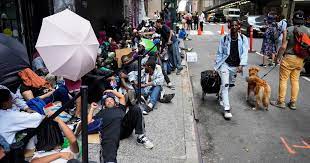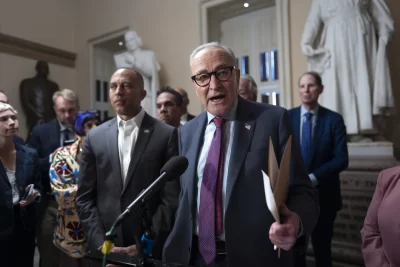
Beleaguered by a continuing influx of asylum seekers, New York City Mayor Eric Adams is further tightening shelter rules by limiting adult migrants to just 30 days in city-run facilities — to help ease pressures on the city’s already struggling shelter system and perhaps dissuade more migrants from coming.
The move was immediately criticized by advocates for migrants and homeless people as unnecessary and heartless.
But the mayor called the move “another step in our efforts to help asylum seekers take the next step in their journeys.”
Adams announced the tightened restrictions on Friday, after the Biden administration said last week it would grant temporary protected status to hundreds of thousands of Venezuelans who had arrived before July 31, a designation that would allow them to more quickly gain authorization to work in the United States.
The move by the federal government has long been sought by Adams and other big city mayors, whose shelter systems are buckling under the strain of a growing number of migrants they must care for, a number that continues to grow daily.
New York City says it has more than 60,000 migrants currently in its care, about a fourth of them of Venezuelan origin. Since the spring of last year, more than 116,000 migrants have arrived from the U.S.-Mexico border.
In July, Adams had placed a 60-day limit on shelter stays that critics say would be in violation of a court ruling that mandates the city provide shelter to anyone who asks for it.
In May, Adams issued an executive order that unilaterally relaxed the city’s right-to-shelter rules, which is now the subject of a legal battle. Earlier this week, Gov. Kathy Hochul, a fellow Democrat, backed the mayor on the matter, saying in an interview on CNN that the right to shelter was never meant to “be an unlimited universal right or obligation on the City to have to house literally the entire world.”
“This is another continuation of just putting people who literally are trying to set up their new life and having additional issues and complications that they have to navigate through,” Murad Awawdeh, the executive director of the New York Immigration Coalition, said in a statement.
Advocates have long pushed the city to provide housing vouchers for the migrants and fund efforts to establish more lasting and permanent solutions, such as expanding the city’s stock of affordable housing — especially difficult given real estate prices already make living in New York City a challenge for many.
“I don’t think anyone wants to actually be in a shelter. It’s not like living in the Ritz,” he said. “It’s actually, for the most part, our newest New Yorkers have been put in tents and in really challenging spaces.”
Critics questioned the need for the time limit when the mayor had gotten a concession from the federal government that would allow Venezuelans a quicker path to securing jobs and become more self-reliant for housing.
“Any policy limiting the amount of time that our clients can reside in shelter is arbitrary and devoid of compassion,” the Legal Aid Society and the Coalition for the Homeless said in a joint statement.
The mayor’s office said housing and other services could drain about $12 billion over three years, forcing him to seek significant budget cuts that would hamper his city’s ability to adequately provide city services.
The mayor vowed to provide migrants with “intensified casework services” to help new arrivals survive outside the shelter system once they have reached the 30-day limit. Migrants who are already on two-month notice but have been unable to find other accommodations will be allowed 30 more shelter days, according to the plan announced Friday.
Over the past two months, the city said, 60-day notices had been issued to about 13,000 adult migrants,
Deputy Mayor for Health and Human Services Anne Williams-Isom has said that the city needs to more quickly transition migrants into other housing.
The city said it has opened 210 emergency shelters, including 17 of what it called “large-scale humanitarian relief centers.” And it is looking for more space, including erecting additional tents to house cots for migrants who need a place to sleep.






